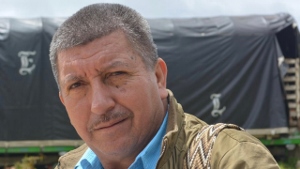Colombia remains one the most dangerous countries for social leaders this year has already seen at least seventy-two assassinations1. While the Colombian government refuses to recognise the systematic nature of the violence2, numbers indicate that those defending their territories from the exploitation of natural resources and illegal economic activities continue to be the main targets of threats and attacks.
Colombia Solidarity Campaign members are saddened to learn about the killings of Marco Rivadeneira and Carlota Salinas two community organisers who have been working in areas disproportionately affected by armed violence and poverty.
Marco Rivadeneira

On 19 March, Marco Rivadeneira was attending a peasant meeting in Puerto Assis when three unidentified armed men dragged him outside and later killed him. Marco was the president of Puerto Asis Peasant Association (ASO-PUERTOASIS) and a board member of the National Agrarian Coordination (CNA) one of the largest peasant organisations in Colombia. He was actively involved in the People’s Congress. In recent years, Marco has been involved in negotiations with state institutions for substitution of illicit crops in several villages in Putumayo; he has been advocating for viable alternatives for coca-growing peasant families.
Carlota Isabel Salinas
 On 24 March, Carlota Isabel Salinas was shot dead by armed men outside her home in San Pablo, Bolivar. Carlota was a member of Popular Women’s Organisation (OFP) a grassroots women’s movement that promotes peaceful resistance against all forms of violence in the Magdalena Medio region. OFP members suffered decades of systematic violence from paramilitary groups who perceived the women’s movement to be a threat to their economic interests in the region. Recently, the Colombian State recognised the damage that was suffered by OFP members and started the collective reparation process. Carlota was killed on the first night of the national coronavirus lockdown. On the day of her death, Carlota was organising food parcels for low-income families affected by a public health crisis.
On 24 March, Carlota Isabel Salinas was shot dead by armed men outside her home in San Pablo, Bolivar. Carlota was a member of Popular Women’s Organisation (OFP) a grassroots women’s movement that promotes peaceful resistance against all forms of violence in the Magdalena Medio region. OFP members suffered decades of systematic violence from paramilitary groups who perceived the women’s movement to be a threat to their economic interests in the region. Recently, the Colombian State recognised the damage that was suffered by OFP members and started the collective reparation process. Carlota was killed on the first night of the national coronavirus lockdown. On the day of her death, Carlota was organising food parcels for low-income families affected by a public health crisis.
It is alarming that both killings of social leaders occurred in municipalities that were prioritised for Territorially Focused Development Programmes (PDET) and the National Comprehensive Program for the Substitution of Crops Used for Illicit Purposes (PNIS). At the heart of both programmes is a promise of meaningful participation of communities in planning, implementation and evaluation of territorial development plans. The continuing threats and killings of social leaders jeopardises the promise of peace and guarantee of human rights in Colombia.
2https://www.eltiempo.com/politica/gobierno/ministra-arango-compara-muerte-de-lideres-sociales-con-asesinatos-por-robo-de-celulares-468678
Â

